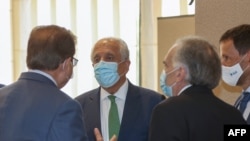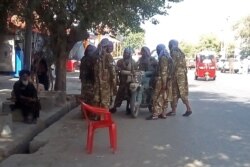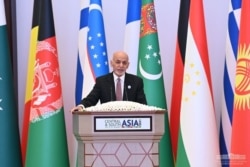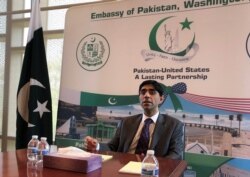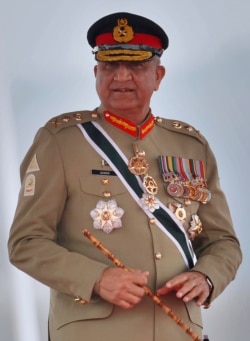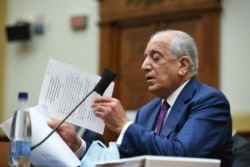Top civilian and security officials in Pakistan say they “are trying very hard” to persuade Afghanistan’s Taliban to negotiate an end to the war with rival Afghans, pushing back against charges Islamabad is behind the Islamist insurgency’s battlefield victories.
“Stop blaming the victim,” National Security Advisor Moeed Yusuf told VOA in written remarks Tuesday while responding to Afghan allegations the Pakistani military continues to support the Taliban. He recounted more than 80,000 casualties and about $150 billion in economic losses Pakistan has suffered due to domestic militant backlash for joining the U.S.-led war in Afghanistan.
The Taliban have captured dozens of Afghan districts, several provincial capitals, and have threatened many more since early May when the United States and NATO allies began withdrawing their last remaining troops from the war-torn country after 20 years.
In more than a few cases, U.S.-trained Afghan National Defense and Security Forces (ANDSF), have either surrendered or abandoned districts to escape Taliban advances, and some have fled into Pakistan, Iran and Tajikistan.
Top Pakistani security officials in background briefings this week ruled out the possibility of a Taliban takeover of Kabul, saying Afghan security forces are “better trained” and “better equipped” to prevent that from happening.
The officials, who spoke on condition of anonymity, argued that if Afghan military commanders “effectively use their cards” on the battlefield., and if U.S. political as well as financial assistance keeps coming in, insurgents will find it increasingly hard to sustain pressure on ANDSF and the war likely will be prolonged.
Kabul blames Islamabad for the insurgents’ victories, citing the alleged presence of Taliban leaders and safe havens on Pakistani soil.
Afghan President Ashraf Ghani said last month that 10,000 jihadi fighters recently entered his country from Pakistan and other places to join the Taliban ranks in their fight against his national security forces.
Social media users in Afghanistan have launched a campaign under the #SanctionPakistan, demanding the global community punish the country for its alleged support of the Islamist insurgents.
Islamabad has consistently dismissed allegations it is providing any military assistance to the Taliban, blaming the nearly 3 million Afghan refugees in Pakistan for being a perfect hiding place for insurgent fighters.
“If [the] Afghan elite have looted and plundered their country rather than building trust of Afghans in their governance, the least they can do is accept that,” Yusuf said.
“Trying to use Pakistan as a scapegoat is not only unfortunate, it is disingenuous and unethical. Everyone can see through the social media propaganda,” the adviser added.
“We are told that over a trillion dollars were put into Afghanistan and much of that into the ANDSF to prepare the army and the security forces. Is Pakistan asking them to surrender? What is going on with this well-equipped and trained force?”
Yusuf asked. “At most, the other side has guns mortars and rockets. We can’t understand, where have these trillions of dollars gone? That’s a question that I think, you know, Western countries need to ask.”
On Tuesday, the head of the Afghanistan Independent Human Rights Commission, Shaharzad Akbar, said the Kabul leadership also shared responsibility for the deepening crisis facing her country.
“Would we be here today if those at the highest levels of leadership in the country in the past 20 years didn’t indulge in, empower & tolerate corruption & looting of the state?” Akbar tweeted.
“There should be as much anger at the failure of the Afghan political leadership as anything else,” she wrote.
Pakistan takes credit for using its leverage with the Taliban to bring them to the table for talks with the U.S. that culminated in the February 2020 troop withdrawal agreement.
U.S. officials also acknowledge Islamabad facilitated peace talks between the Taliban and Afghan government representatives, which started in Qatar last September, but have met with little success.
Pakistani officials complain that an “unconditional” and accelerated U.S. military exit, and not Pakistan, is to be blamed for the worsening Afghan security situation.
Yusuf stressed Tuesday that a peaceful Afghanistan is key to ensuring Pakistan’s security and economic stability.
“Anything but an inclusive political settlement means a protracted conflict, through which instability will likely spill over into Pakistan. So, our nightmare scenario is a protracted conflict,” he said.
A senior security official privy to Islamabad’s peace efforts underscored Pakistan’s diplomatic outreach to warring Afghans, saying the Pakistani military chief, Gen. Qamar Javed Bajwa, undertook several trips to Doha, which houses the Taliban’s political office, to meet insurgent leaders there.
The official, speaking on condition of anonymity, said Bajwa urged the Taliban to desist from pursuing their military campaign and instead focus on finding a political settlement.
The official said the Pakistani military chief also visited Afghanistan repeatedly and met Ghani and other political leaders there in his bid to encourage them to move the stalled peace process forward.
“We are not looking for [a] Taliban government in Afghanistan” the official said while responding to Afghan charges that Islamabad is seeking the return of Taliban rule.
“We have no favorites in Afghanistan. We are trying very hard [to further the peace process]. But there is confusion in Kabul. We also are telling the Taliban that no one will accept you if you do not show flexibility and try to seize power by force.”
Pakistan’s leverage with the insurgents, however, is waning in the wake of the foreign military withdrawal and ensuing insurgent battlefield advances in Afghanistan, Yusuf emphasized.
Senior Pakistani security officials insisted that no military means will be used against insurgent fighters sheltering in Afghan refugee camps, with some housing 400,000 civilians.
“We don’t want to annoy anyone, but we are telling everybody that we have done enough,” the officials said when asked if Islamabad is under pressure from Washington to use force against Taliban fighters on Pakistani soil.
U.S. special envoy for Afghanistan reconciliation Zalmay Khalilzad, who negotiated the landmark peace-building deal with the Taliban, said last week that Afghan forces “should have done a lot better than they are doing” in their battles with the insurgents.
“We continue to support Afghan security forces, and we are committed to supporting those forces well into the future, Khalilzad told VOA.
While there is no immediate reaction from Kabul to Pakistani assertions, Afghan officials appear unconvinced that cross-border militant infiltration has stopped.
Khalilzad sounded skeptical about whether Pakistan was doing enough to help in promoting a political settlement to the Afghan conflict.
“Pakistan has a special role and responsibility, given also that many Taliban leaders are in Pakistan, located there to do what it can to encourage peace and a political settlement as soon as possible, for it will be judged internationally also as to whether it has done all that it can or it could to promote a political settlement.”
Pakistani officials also cite construction of a robust fence and hundreds of new forts and outposts, equipped with the latest surveillance technology, along their more than 2,600-kilometer border with Afghanistan, to deter militant infiltration in either direction.
Officials said the Pakistani border security project, built with some financial contributions from the U.S. and the UAE, has blocked dozens of informal crossings that militants until a few years back were using to undertake subversive acts in both countries.
Pakistani military commanders say that security challenges and a lack of manpower have prevented Afghans from adequately guarding their side of the frontier. They say while Pakistan has nearly 1,250 posts on its side, Afghans have set up fewer than 400 posts.
Pakistan has made all possible efforts to improve relations with Kabul, but the response from them has not been positive, officials said in background briefings .They explained that Islamabad had even offered to provide Pakistani engineers to help maintain the Afghan Air force after all U.S. contractors leave Afghanistan.
“We have also offered them to send a group of Afghan army officers to jointly monitor the border with us for any illegal activity, but we received no affirmative response from them to date.”




